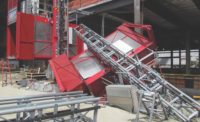I was born with part of my left hand missing. I only have my thumb, no fingers. I don’t ever call this a disability, which in my view is something that’s in someone’s mind. In fact, this circumstance set my goal in life: to do something with one hand better than someone with two hands could. I’m from Lake Charles, La., and when I was younger, I rodeoed, played basketball and baseball and learned how to hunt, fish and golf. Any time I could do something better than a guy with two hands, it gave me a sense of accomplishment and pride.
I became a superintendent at The Walsh Group, overseeing most of the crane operations on projects in South Central Texas. On the morning of Oct. 23, 2015, I visited a jobsite prior to catching a flight home to Austin. Because I had a little extra time, I thought I’d look at some boom hoist cable on cranes at the jobsite. We had a focus on boom hoist cable and boom hoist rope inspection at the time, and I was just going to do a visual inspection.
I made the choice that morning to climb up on the crane and do the inspection by myself. That is a choice I made, and it’s one with which I must live.
Typically, when I do a monthly or annual inspection, I use the buddy system, working together with someone to ensure safety. That day, I got up on the crane alone, knelt down on the platform and told the operator to go ahead and kick in his boom really slowly, at an idle, so that I could visually inspect a hoist rope as it unwound off the drum.
After watching about a layer and a half, something caught my attention. To get a better look when it came around again, I adjusted my body position and somehow lost my balance.
I put my hands out to catch my fall, and my right hand landed on the hoist rope, just in front of the sheave. In a split second my hand rolled back through the sheave, which severed off my digits.
This experience quickly brought into focus just how many people are impacted by a single choice. From the team who immediately rushed to help me, to the call I had to make to my wife to tell her what had happened, to the crew on the jobsite that day who witnessed the event. All of those people were affected by my choice—some directly, and others through a ripple of emotion around me.
We need to consider the choices we make—on an individual, project and company basis— because their results define our lives. Our first choice should always be safety.
As they loaded me into the ambulance, the assistant project manager came around to check on me. It was critical for me to tell him to make sure the crew and the crane operator knew the accident was not their fault.
It was my choice and it was my injury. No one else was to blame.
When I got home, the team I work with in Texas provided me with a huge amount of support during my recovery. It’s impossible for me to share how much I benefitted from the words of encouragement and support from these people. On many days, they lifted my spirits and got me through that tough time. Today, I’m back at work, running cranes and challenging myself every day, because 90% of the battle is mental, and I can do anything I want to that I was able to do before. Sometimes, I just have to figure out a new approach to accomplishing a task.
I was born with the challenge of my left hand. My right hand is the result of the choices I made, and my recovery depended on me taking responsibility for that. The more I owned the choices I made, the faster I was able to move forward. I made a choice a long time ago not to be a victim.
That’s why my biggest takeaway from this is about choice. We need to consider the choices we make—on an individual, project and company basis—because their results define our lives. Our first choice should always be safety.
If you have an idea for a column, please contact Viewpoint Editor Richard Korman at kormanr@enr.com.





Post a comment to this article
Report Abusive Comment